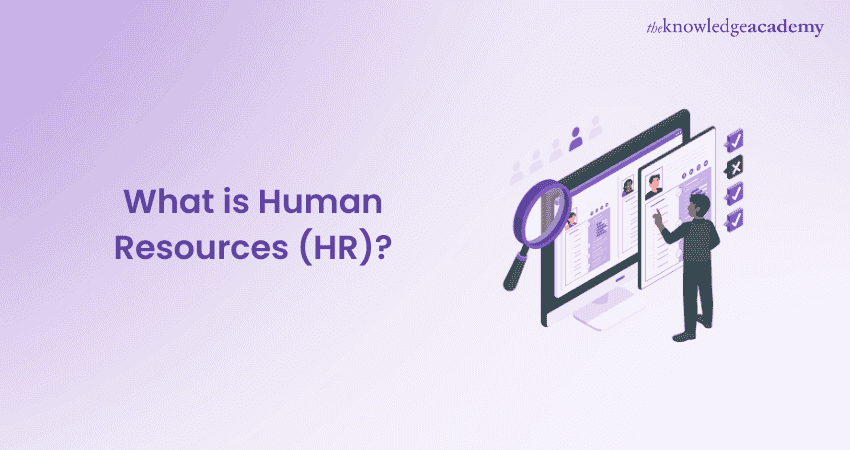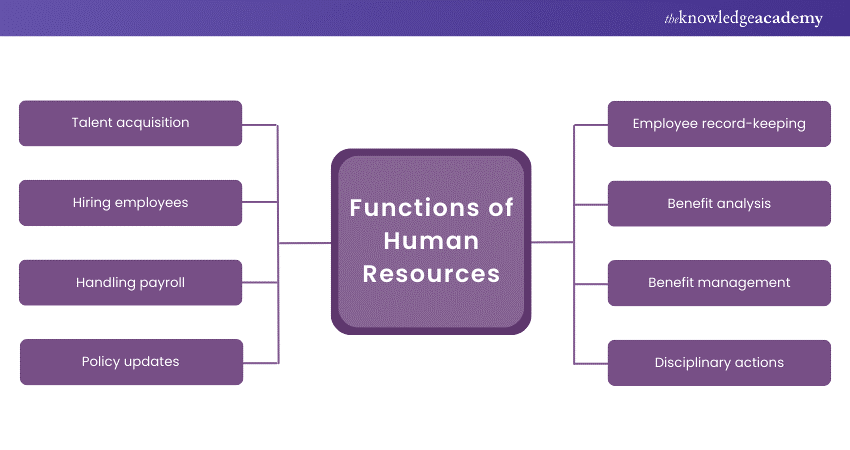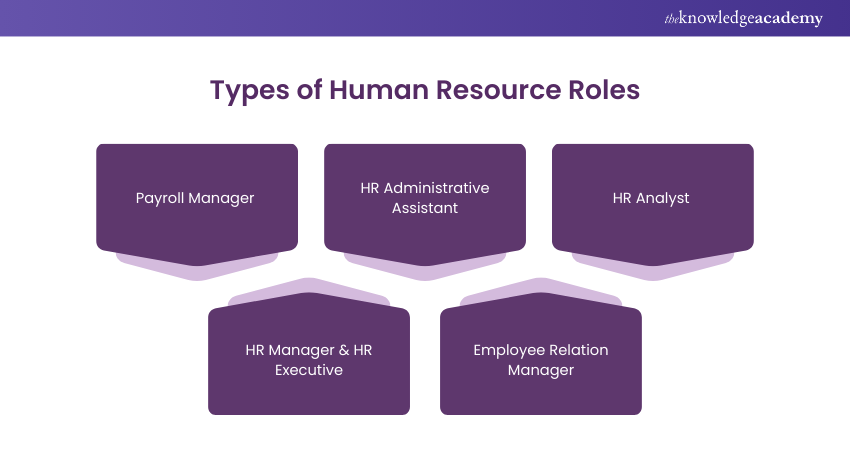We may not have the course you’re looking for. If you enquire or give us a call on +46 850282424 and speak to our training experts, we may still be able to help with your training requirements.
We ensure quality, budget-alignment, and timely delivery by our expert instructors.

Behind every thriving organisation lies the heartbeat of Human Resources. Human Resources (HR) go beyond just one department; they form the catalyst of the organisation’s strategic vision. From recruitment to retirement, they are critical to maintaining a positive work environment and ensuring compliance with employment laws. Additionally, with the evolving corporate domain. HR is continuously shaping adaptable and resilient organisations for setting a foundational stage for a long-lasting success. Let’s dive deeper into our blog to discover What is HR and its key functions, roles, and responsibilities that constitute HR as an indispensable pillar in the corporate structure.
Table of Contents
1) What is Human Resources (HR)?
2) Functions of Human Resources
3) Key Activities of Human Resources
4) What are the Different Human Resource Roles?
5) What Are the Five Main Areas of HR?
6) Conclusion
What is Human Resources (HR)?
Human Resources (HR) are the crucial cornerstone for any organisational success by providing invaluable support in all management departments. Since the advent of modern corporate practices, HR has played a multi-faceted role in the rapidly evolving business environment by shaping everything, ranging from the hiring and selection process to the company's management.
They also play a crucial role in developing a highly efficient and productive workforce through continuous training and development programs. They are, in fact, responsible not only for different compensations, benefits, Absence Management, and performance programs for employees, but also act as advocates of Employee interests in terms of organisational well-being and culture.
An HR department serves as the guardian of legal compliance, as the people working therein should know about the ever-occurring employment laws and regulations to ensure protection for the company and its employees. In such a dynamic landscape, HR makes a key contribution to improving organisational performance and competitiveness through satisfaction, employee engagement, and employee retention by creating inclusive and supportive workplaces.

Functions of Human Resources
Discover everything you need to know with our comprehensive Payroll Manager Job Description!
Human resources have a critical role in maintaining businesses' integrity and seamless functionality. Here are their vital functions explained below:

1) Talent Acquisition
Hiring is a critical function that necessitates strict professionalism, which can only be achieved through Human Resource Services. It may involve CV screenings and interviews to choose the most capable candidates who can navigate the organisation forward. HR professionals also assist in negotiating service terms and conditions to ensure the satisfaction of both the company and the applicant.
They conduct credential checks, employment history, and criminal records to validate the details declared by the recruit. Additionally, the Talent Acquisition Specialist plays an integral role by guiding the onboarding process, providing the necessary training, orientation, and support. This ensures that new staff members settle comfortably into the working environment and function efficiently.
2) Hiring Employees
Human Resources (HR) departments are the entities that carry out recruitment process, which involves the identification, attraction, and retention of excellent talent to bring success to the organisation. HR professionals, therefore, effectively diagnose organisational functional and operational needs and screen for the required qualifications and requirements. They then refine the process to identify and engage with the best candidates.
They proactively seek out talent in the market, using various recruitment methods to attract top performers. Although, sometimes, this involves HR professionals directly reaching out to skilled individuals from competing companies.
HR plays a critical role in ensuring ethical recruitment practices, helping the organisation maintain a competent, diverse workforce. This approach supports growth and aligns with the firm's objectives, fostering a strong, cohesive team.
Build a career in data analytics for improved HR decision-making with our HR Analytics Training - Join now!
3) Handling Payroll
HR professionals accurately calculate employees' salaries, taxes, and deductions to fulfil all regulatory and in-house policy requirements. They pay close attention to the payroll process by ensuring timely and accurate pay to all employees in order to win their trust and workforce satisfaction.
They actively seek to detect any dispute related to payroll management and react swiftly, either through investigation or resolution, to maintain employee morale and organisational integrity. Furthermore, they are responsible for contributing significantly to organisational stability through improved Employee Engagement and retention
4) Policy Updates
The HR function ensures the organisation's compliance with ongoing labour laws, regulations, and even industry standards. Additionally, they consistently review policies and procedures to ensure compliance with legal requirements and the adoption of industry best practices. They also have a crucial role in effectively communicating new policies to employees through different channels, bringing complete awareness and compliance to the organisation.
HR actively collects feedback from stakeholders to identify areas for improvement and update policies. This ensures a positive work environment, which is crucial for employee satisfaction and organisational success.
Furthermore, HR ensures organisational integrity by enhancing company culture, maintaining compliance, and staying vigilant to regulatory changes. However, it’s important to recognise the Limitations of Human Resource Accounting in capturing the full value of human capital. This proactive approach helps HR respond swiftly to any legal or regulatory developments, contributing to a stable and compliant workplace environment.
5) Employee Record Keeping
HR maintains confidentiality of information that includes details such as personal information, service records, performance appraisals, and employees’ training records. They also ensure the authenticity and credibility of information, its availability, and adherence to organisational and information security laws and regulations.
Human Resources implements secure systems and protocols to store and retrieve employees' information to deliver effective services, make necessary decisions, and ensure adherence to regulations. Furthermore, maintaining comprehensive records allows HR to manage personnel effectively, support Strategic Workforce Planning, and ensure the organisation benefits from increased transparency and accountability.
6) Benefit Analysis
Human Resources thoroughly analyses benefit programs to assess their effectiveness and competitiveness in attracting and retaining talent. They collect feedback from employees and ensure their relevancy with current industry benchmarks. They also track cost-effectiveness and identify areas where betterment or realignment is required.
HR balances employee needs with organisational objectives by offering market-competitive benefits. It continuously monitors and adjusts these offerings to ensure employees are well-satisfied, engaged, and cared for in all aspects of well-being, helping the organisation remain successful and competitive in the marketplace.
Cultivate career-driven HR alignment with our HR Strategy Training - Sign up today!
7) Benefit Management
The employee benefits program is comprehensive and spans across the wide range of life cycle, ranging from enrolment to changes (including termination) They also serve as the focal point of contact for employees for their queries regarding benefits.
Additionally, HR effectively communicates the range of benefits so that employees are informed of the available resources and opportunities. They also educate employees to maximise the benefits offered, thereby ensuring employees derive the utmost benefit in terms of well-being and satisfaction.
HR meticulously manages Employee Benefit Programs, maintaining effective communication to ensure smooth administration.This approach develops a healthy work environment and contributes to the overall organisational success.
8) Disciplinary Actions
Human Resources deals with disciplinary actions in a fair, consistent, and legally compliant manner. They take appropriate action on any alleged misconduct or performance issues, which includes gathering evidence and determining the necessary course of action.
In addition, HR conducts disciplinary meetings, issues warnings or corrective actions, and provides support and resources to help employees improve. By doing so, HR ensures that the organisation maintains high standards of conduct and performance, ultimately contributing to a positive and productive workplace.
Download the HR Glossary to master HR terms and processes today!
Key Activities of Human Resources
Here are the key, people-related activities that HR must effectively manage to add value to a company:
1) Managing People Effectively: HR ensures that employees are deployed in roles that maximise their skills and contributions, further enhancing overall productivity and job satisfaction.
2) Linking Appraisals to Competencies: By aligning performance reviews and compensation with employee competencies, HR motivates staff to develop their skills and achieve organisational goals.
3) Calculating Fair Compensation: HR determines competitive salary rates and assembles a benefits package that attracts and retains top talent, ensuring employee satisfaction and loyalty.
4) Developing Key Competencies: HR focuses on building skills and capabilities that drive both personal growth and organisational success, fostering a culture of continuous improvement.
5) Boosting Innovation and Flexibility: HR encourages a work environment that supports Innovative Thinking, adaptability, and creative problem-solving, helping the organisation stay competitive in the market.
6) Applying New Work Approaches: HR implements modern strategies for workflow optimisation, career progression, and employee mobility, ensuring a dynamic and resilient workforce.
7) Integrating New Technology: HR oversees the adoption of new technologies, ensuring that staff are well-trained and informed, which enhances efficiency and productivity.
Master proficiency in HR management skills with our HR Management Course - register now!
What Are the Types of Human Resources Roles?
Human resources is a broader field that incorporates numerous roles and responsibilities. Below, we have listed those roles to help you make a seamless decision about your career advancement:

1) Payroll Manager
Payroll managers are responsible for managing the payroll process within an organisation. They ensure all employees are paid accurately and timely in compliance with government regulations and are aware of the organisational payroll policies.
2) HR Administrative Assistant
HR administrative assistants assist the HR managers and executives in the day-to-day clerical activities, ranging from scheduling appointments and managing job application policies. The HR Officer Job Description often overlaps with these duties, ensuring a seamless flow of administrative support.
3) HR Analyst
HR analysts are responsible for analysing data related to hiring, employee performance, and other HR functions. They generate valuable insights that help optimize the candidate selection process, as outlined in the HR Functions Guide.
4) HR Managers and HR Executive
HR managers and HR executives (with hierarchies higher than HR managers) are senior-level HR management professionals responsible for overseeing overall HR functionalities. They manage critical tasks, including conducting inquiries and handling sensitive issues such as physical assault, which are extensively covered in HR Management Books.
5) Employee Relations Manager
Employee Relations Managers play crucial roles in ensuring optimal working conditions for employees. They handle conflicts, address employee grievances, and foster an organisation's supportive and employee-friendly work culture.
Prepare for success with our expert HR Interview Questions – get ready to impress your next employer!
What Are the Five Main Areas of HR?
The five main areas of HR management are important for developing a productive and positive work environment. These areas include recruitment and onboarding, training and development, compliance management, employee engagement, and workforce planning. Each function plays a vital role in supporting employees and ensuring smooth organisational operations.
Recruitment and onboarding attract and integrate new hires effectively. Personnel Management and Human Resource Management help employees to develop new skills and improve performance through training and development. Compliance management ensures adherence to employment regulations. Employee Engagement Strategies keep employees satisfied and motivated by promoting a positive work environment and recognizing their contributions. Workforce Planning aligns organisational goals with employee needs, identifying gaps and implementing initiatives for success.
Master proficiency in HR management skills with our HR Management Course - Register now!
Conclusion
We hope you got an overview of What is HR. For a deeper understanding, exploring resources like the HR Strategy Models PDF can be invaluable. HR's importance lies in aligning employees’ aspirations and professional capabilities with the objectives of the organisation. They strive to go beyond merely advocating for the continuous maximisation of employees’ potential. Instead, they focus on fostering an organisation that not only survives but thrives in the long-term corporate landscape.
Become a leader in the HR Pro with our Certified HR Manager Course - join today!
Frequently Asked Questions
What are the Three Biggest Issues in HR Today?

The three biggest issues in HR today are diversity and inclusion, employee well-being and Mental Health, and remote work management. HR professionals are grappling with creating inclusive workplaces, supporting employee wellness, and managing remote teams effectively amidst evolving workplace dynamics.
What Is the Role of Human Resources?

The primary roles of human resources are to handle Recruitment Processes within the organisation, such as hiring the right people and managing effective employee-organisational relationships. They also oversee payroll structure and ensure adequate training for newer candidates.
What are the Other Resources and Offers Provided by The Knowledge Academy?

The Knowledge Academy takes global learning to new heights, offering over 3,000 online courses across 490+ locations in 190+ countries. This expansive reach ensures accessibility and convenience for learners worldwide.
Alongside our diverse Online Course Catalogue, encompassing 19 major categories, we go the extra mile by providing a plethora of free educational Online Resources like News updates, Blogs, videos, webinars, and interview questions. Tailoring learning experiences further, professionals can maximise value with customisable Course Bundles of TKA.
What is The Knowledge Pass, and How Does it Work?

The Knowledge Academy’s Knowledge Pass, a prepaid voucher, adds another layer of flexibility, allowing course bookings over a 12-month period. Join us on a journey where education knows no bounds.
What are the Related Courses and Blogs Provided by The Knowledge Academy?

The Knowledge Academy offers various HR Leadership Courses, including the HR Course, HR Management Course, and the Human Resource Budgeting Training. These courses cater to different skill levels, providing comprehensive insights into the HR Manager Salary.
Our HR Resources Blogs cover a range of topics related to human resources management, offering valuable resources, best practices, and industry insights. Whether you are a beginner or looking to advance your HR skills, The Knowledge Academy's diverse courses and informative blogs have got you covered.






 Top Rated Course
Top Rated Course



 If you wish to make any changes to your course, please
If you wish to make any changes to your course, please


